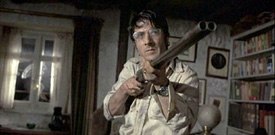When I first saw this film in college, I hated it. Loathed its misogyny. Now seeing it 10 or so years later, I respect it more, but my issues with the film have not changed. Sam Peckinpah is a man fighting his own 19th Century view of male-female relations as well as violence. You see this over many of his films. He is a great filmmaker, who skillful plays out his stories and fills them with provocative ideas. But what does he leave the audience feeling? What is he saying? STRAW DOGS represents Peckinpah's own dark internal struggle and the dark wins out too many times over the truth.
David Sumner (Dustin Hoffman, THE GRADUATE) is an American intellectual who moves to England with his British wife Amy (Susan George, DIRTY MARY CRAZY LARRY) to do his research. David is very non-confrontational, allowing local thugs to push him around. Amy resents him for it and flirts with her burly ex-boyfriend Charlie Venner (Del Henney). Tensions grow between David, Amy and the townsfolk, which turn to violence.
Other key characters include Charlie's cousin and town flirt Janice Hedden (Sally Thomsett), Janice's younger brother Bobby (Len Jones), Janice's father and rude town drunk Tom Hedden (Peter Vaughan, BRAZIL), sadistic handyman Norman Scutt (Ken Hutchison, GANDHI), giggling ratcatcher Chris Cawsey (Jim Norton, DRIVING LESSONS), brooding lorry driver Phil Riddaway (Donald Webster), town simpleton Henry Niles (David Warner), amateur magician Reverend Barney Hood (Colin Welland, KES) and local one-armed magistrate John Scott (T.P. McKenna, THE LIBERTINE).
The core premise is that violence is within all of us and that every person has their breaking point. David is physically weak and shies away from interaction with manly men. He has buried resentment toward bullying and intimidation that other men inflict on him, making him feel less like a worthy man. Even though David and the men of the town are extreme representations of this idea, this is the part that works and holds up. He deals with dark issues of male identity.
Where the film goes awry is with the portrayal of the women. Amy's resentment toward David's inability to stand up for himself only adds to his emasculation. There relationship is complex. She is more passionate and he is more reserved. He is more mature and she is childish. This spurs her to flirt with the testosterone oozing Charlie. But what is Peckinpah saying when violence comes upon her? Is he saying she was asking for it? Does she enjoy it, because her husband is such a wimp?
SPOILER ALERT…
The infamous rape scene is controversial for a reason. Amy resists Charlie, but eventually enjoys his aggressiveness. This, in of itself, is disturbing, but not what really makes the film break down. Her reaction is mixed and not unbelievable for this individual character. However, the violence at the end, especially a moment between David and Amy, seals the film's fate as a misogynistic fantasy where all a woman needs is a good schlooping and to be smacked around a little when she gets out of line. The final rip-off of OF MICE AND MEN, which leads to the siege on David's house, brings up good ideas, but is forced and turns the townsfolk into one-dimensional monsters. Additionally, Amy's switch from strong to weak is abrupt and further exasperates the negative portrayal of women.
END SPOILER…
Ultimately, the film never escapes its support for archaic views of what makes a man and what a woman needs. Additionally, the vigilantism of the conclusion is akin to exploitation horror films like LAST HOUSE OF THE LEFT and never escapes a slasher movie vibe. Peckinpah and his defenders claim it's an exploration of violence not a supporter of it. They point to the blankness of the end as a sign of the pointlessness of violence. But David's expression at the very end undermines this reading completely. There is a great movie lurking within this film, which is what I think many supporters respond to. However, denying or overlooking the flaws is an exercise in self-denial. A flawed film can still be inspiring, but it doesn't fix the flaws, making the overall message work. Some flawed classics are not ruined by their shortcomings, but STRAW DOGS' entire point is overshadowed by its problems. I don't believe Peckinpah is a chauvinistic pig. Compare the rape scenes in STRAW DOGS with that of BRING ME THE HEAD OF ALFREDO GARCIA and do not tell me that Peckinpah was making an apology like D.W. Griffith did when he made INTOLERANCE following the racist BIRTH OF A NATION.








